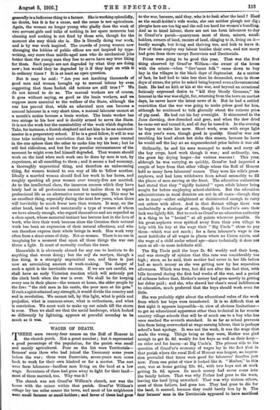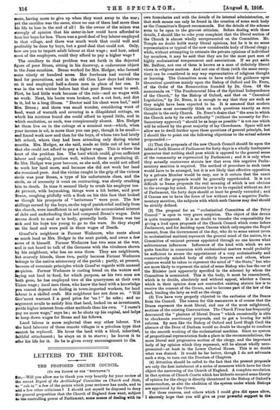WAGES OF DEATH.
THERE were twenty-four names on the Roll of Honour in the church porch. Not a great number ; but it represented a good percentage of the population, for the parish was small and mainly agricultural. Four on the list were Territorials— farmers' sons these who had joined the Yeomanry some years before the war ; three were Reservists, seven-years men come back to work for their own kindred or for a master. The rest were farm labourers—landless men living on the land at a low wage. Seventeen of these had gone away to fight for their land— most of them married, too. Why was it ?
The church was not Granfer William's church, nor was the house with the mixen within that parish. Granfer village lay ten miles nearer the town, and most of his neighbours were small farmers or small-holders ; and fewer of these had gone to the war, because, said they, who is to look after the land Hard as the small-holder's wife works, she can neither plough nor dig ; ploughs here are too big and the soil too hard for women's handling. And as to hired labour, there are not ten farm labourers to-day in Granter's parish—quarrymen most of them. miners, small- holders, owners of land, renters of land, clinging to it living on it— hardly enough, but living and thriving too, and loth to leave it. Few of these employ any labour besides their own, and not many had gone from there except Reservists and Territorials.
Prices were going to be good this year. That was the first thing observed by Grant er William—the owner of the house with the mixen—when " Gov'ment folk " came down to buy hay in the villages in the black days of September. As a matter of fact, he had had to take less than he demanded, even in those days of stress, the price he asked being beyond even a Governmental limit. He had no kith or kin at the war, and beyond an occasional furiously expressed desire to " kill they bloody Germans." his interest in the war was slight, for, returning from the town on market days, he never knew the latest news of it. But he had a settled conviction that the war was going to make prices good for him, although he oontinued to talk gloomily about the ruinous pries of pig-meaL He had cut his hay overnight. It shimmered in the June dawning, dew-drenched and grey, and when the dew dried he came out and turned it, and all day he tossed it. In the evening he began to make his mow. Short work, even with crops light as this year's were, though good in quality. Granf'er was not troubling his head about hot rinks this season, because he know he would sell the hay at an unprecedented price before it was old,
Ordinarily, he and his eons managed to make and carry all the hay crops, hard work though it was ; and ordinarily, too, the grass lay drying longer—for various reasons ! This year, although he was carrying so quickly, Granfer had imported s couple of boys from that other village where the Roll of Honour held so many farm labourers' names. They were his wife's great- nephews, and had been withdrawn from school ostensibly to fill the places of men serving at the front. The education authorities had stated that they " rigidly insisted " upon adult labour being sought for before employing school-children. But the education administrators in rural districts are not in all cases—though they are in many—either enlightened or disinterested enough to carry out orders with effect. And in that distant village there was undoubtedly a shortage of mon, though in Granter's own their lack was lightly felt. But to such as Granter an education authority is a thing to be " bested " at all points wherever possible. So his great-nephews were spirited away from their own village to help with his hay at the wage their " Big Uncle " chose to pay them—which was not much ; for a farm labourer's wage is the most indefinite of all wages in places where no Union exists, and tho wage of a child under school age—siuce technically it does not exist at all—is more indefinite still.
The Big Uncle paid the boys 2s. 6d. weekly and their keep, and was strongly of opinion that this rate was considerably too high ; since, as he said, their mother had never in her life before had so much money as she was getting now by her separation allowance. Which was true, but did not alter the fact that, with bills incurred during the first bad weeks of the war, and a period of sickness before that, Mother's money had gone mostly in getting her debts paid ; and she, who shared her class's usual indifference to education, much preferred that the boys should work oven for little.
She was probably right about the educational value of the work from which her boys were transferred. It is so difficult that at first sight it appears impossible—in view of obvious limitations—
to get an educational apparatus other than technical in far remote country village schools that will be of much use to a boy who has once reached the seventh standard. In so far as school prevents
him from being overworked at wage-earning labour, that is perhaps school's best apology. It was not the work, it was the wage that made the wrong. Things being as they were, Mother was glad enough to get 2s. 6d. weekly for her boys as well as their keep—
on cider and fat bacon—at Big Uncle's. Tho piteous side to the
question of Granters economy of wages lay in the fact that in that parish whore the rural Roll of Honour was longest, an impres-
sion prevailed that times wore good for labourers' families just now. From one point of view it looked like it. " Mother," in this case, was at home getting 22s. 8d., with two boys out at work getting 2s. 6d. apiece. So much money had never come into the family before. That was why Father had gone to the wars, leaving the land lying =worked. That was why sixteen other, most of them fathers, had gone too. They had gone to die for the land, it seemed, because they could barely live by it. The four farmers' eons in the Territorials appeared to have sacrificed
more, having more to give up when they went away to the war; yet the sacrifice was the same, since no one of them had more than his life to lose in the end of all 1 So the owner of the mixen was strongly of opinion that his sister-in-law could have afforded to loan her boys for less. There was a good deal of boy labour employed In that village, and there was much work that could well and profitably be done by boys, but a good deal that could not. Only, how are you to import adult labour at that wage ; and how, asked most of the employers, could they afford to pay a higher wage ?
The corollary to that problem was set forth in the dejected figure of poor Breen, sitting in his doorway, a cadaverous object in the June sunshine. Brean worked for Mrs. Hedger, who farmed some ninety or hundred acres. Her forebears had rented the land for generations, and in the old Corn Law days had thriven on it and employed half-a-dozen men in place of her one. It was in the wet winter before last that poor Breen went to seed. First, he had little work because of the rain—and no wages with no work. Next, his boots were broken, and a cut foot, and dirt In it, led to a long illness. " Doctor said his chest were bad," said hire. Brean ; and there was small wonder, considering want of food, want of warmth and covering in a dilapidated cottage, on which his mistress found she could afford to spend little, and in which sanitation, as such, was conspicuously absent. Mrs. Hedger let them live on in the cottage at a nominal rent—which, when your income is nil, is more than you can pay, though it be small— and found work now and then for the boys, of whom two had lately left school, where they had been attending only during winter months. Mrs. Hedger, as she said, made so little out of her land that she could not afford to pay a higher wage. This is where the knot of the problem lies. The land which could, given sufficient labour and capital, produce well, without them is producing ill. So Mrs. Hedger was poor because, as she said, she could not afford to work her land more, and because she did not work her land she remained poor. And the victim caught in the grip of the vicious circle was poor Breen, a type of his unfortunate class, and the circle, as of necessity it went on contracting, was slowly crushing him to death. In time it seemed likely to crush his employer too. At present, with haymaking, things were a bit better, said poor Breen, coughing pitifully with a flush on his thin face that looked as though his prospects of " bettemess " were poor. The few shillings earned by the boys, on the top of parish relief and help from the church, were insufficient to set against the accumulated interest of debt and underfeeding that had composed Brean's wages. Debt means death to soul or to body, generally both. Breen was too sick and his boys too young to go to the wars. So they stayed on the land and were paid in these wages of Death.
Graaf' er's neighbour is Farmer Wedmore, who rents about as much land as Mrs. Hedger in the next parish, and owns a few acres of it himself. Farmer Wedmore has two sons at the war, and is not heard to talk of the Germans with the virulence shown by his neighbour, who has no sons there. They are neighbours, but scarcely friends, these two, partly because Farmer Wedmore belongs to the native aristocracy of the parish ; partly, at present, because of economic principles which Granf er regards with amazed mu ipicion. Farmer Wedmore is casting bread on the waters and laying out land in food, for which purpose, as his two sons are both gone, he has employed two of the quarrymen at their own Union wage ; local men these, who know the land with a knowledge you cannot depend on finding in town-imported workers, for land labour is a skilled craft. His neighbour has not done so. " Will Gov'mcnt warrant I a good price for 'un P " ho asks; ; and no &gement avails to satisfy him that land, looked on as investment, yields higher interest from other methods than his own. " I cassn't pay no more wage," says he ; so ho shuts up his capital, and helps to keep down wages for Breen and his fellows.
Land labour is more neglected than any other labour. Yet the land labourer of these remote villages is a priceless type that cannot be replaced. He loves the land with a blind, inherited, faithful attachment ; he stays on it to starve ; he leaves it to offer his life for it. So he is given every encouragement to die.































 Previous page
Previous page